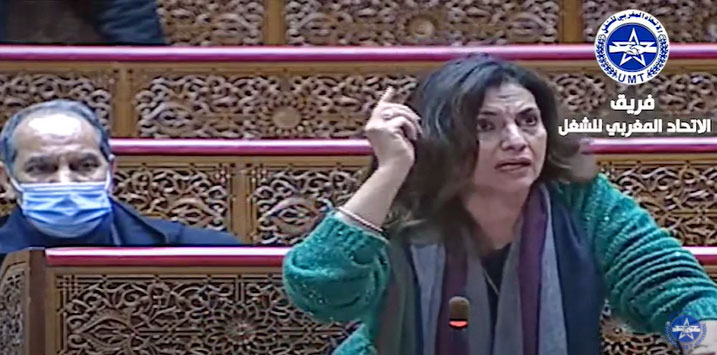
Feb 11, 2021
A 14-year old girl was among the 28 garment workers killed in a factory disaster in Tangier, Morocco, this week. Her mother says she had worked at the factory, an illegal sweatshop, for three years.
The workers were drowned or electrocuted after a flood caused a short circuit. Seventeen others were injured. The facility operated in an underground garage in a residential area with 130 workers, most of them women. A nearby resident rescued some of the workers by throwing a rope into the flooded factory.
“How could this factory have been a secret? Where were the labor inspectors? Where were the local government authorities? Where were the investors?” asked Amal El Amri, a representative in Morocco’s upper house of Parliament and Moroccan Labor Union (UMT) member.
Residents in the area say the sweatshop operated for more than 20 years.
“We must ensure a voice for these workers who have died, and for the many thousands more women workers who toil under the same dangerous conditions,” El Amri said. In January, a fire at another illegal textile factory in Tangier injured one person and destroyed the factory, where 400 people worked.
The UMT and Democratic Labor Confederation (CDT), both Solidarity Center partners, demanded an immediate investigation into the tragedy, and the CDT said in a statement that it holds the state, the government and the employers fully responsible for the workers’ deaths.
Fast Fashion Industry Spawns Illegal Factories
Across from Spain on Morocco’s northern coast, Tangier is a key hub of Morocco’s textile manufacturing. Countrywide, official statistics show 1,200 textile companies with 165,000 workers—27 percent of the country’s industrial employment.
Yet many factories in Morocco’s textile and leather industry—estimates range in the thousands—operate illegally, forcing workers to labor long hours for low pay in often dangerous conditions. A 2012 investigation revealed that workers in illegal Moroccan textile sweatshops work, on average, 55 to 65 hours per week—11 to 21 hours more than the legal limit.
Operating outside national labor laws or standards, illegal factories are a direct response to the demands of the fast fashion industry, in which large brands demand quick response to fashion changes and customer demands and so draw on subcontractors whose workforce is cheaper and its work arrangements informal.
With no job stability and few social protections, garment workers in the informal economy are subject to exploitation and abuse, with no health coverage, pensions or other social and legal protections. Some one-third of Morocco workers are in the informal economy, which accounts for 14 percent of the country’s gross domestic product.
‘Companies Must Be Held Accountable’
As the global labor movement joins in calls for accountability in a supply chain where workers pay the price for cheap production, the Morocco Contribution Forum is urging the government to close all workplaces without health and safety protections and establish a policy to ensure severe penalties for companies operating outside the law.
Public officials must “improve the rights and living standard of marginalized people who are victims of oppression and violence, whether it is on the way to work, or in the workplace, and to provide them with the minimum conditions of human rights,” the Forum, a Solidarity Center partner, said in a statement.
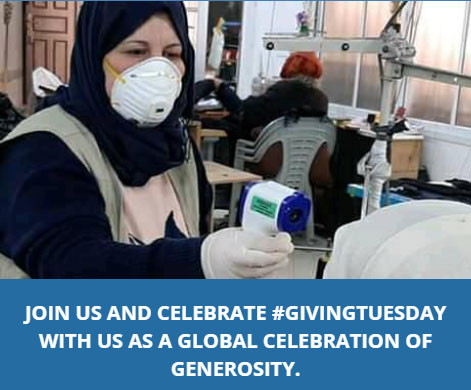
Dec 1, 2020
When the pandemic hit, the Solidarity Center quickly pivoted its programming, drawing on its extensive network in more than 60 countries to rapidly respond to the unprecedented COVID-19 crisis.
- In Kenya, Solidarity Center joined with the Central Organization of Trade Unions (COTU-K) to protect market vendors and reduce community spread of COVID-19 by providing infection control supplies for distribution through worker organizations representing nearly 6,000 informal workers.
- With the Kuwait Trade Union Federation (KTUF), the Solidarity Center connected with migrant worker associations to distribute 100,000 COVID-19 information brochures to 3 million migrant workers in Bengali, French, Hindi, Sinhala Tagalog and addressed unpaid wages and unsafe living arrangements by working with the government officials to solve urgent issues.
- Partners in the Solidarity Center Workers Empowerment and Participation program in Bangladesh distributed 30,000 COVID-19 awareness leaflets to community members and helped reduce rent for garment workers laid off due to COVID-19.
“Whether we were creating innovative organizing ideas or rapidly mobilizing resources for local campaigns and for the sheer survival of unions during this crucial period, we stood strong by our commitment to protect workers and their rights worldwide and strengthen solidarity with our union partners during this time of crushing layoffs and economic devastation,” says Solidarity Center Executive Director Shawna Bader-Blau.
Today, #GivingTuesday, the Solidarity Center is raising $25,000 to support grassroots programs worldwide.
Will you join us to go above and beyond in order to meet this goal? Any gift you make, regardless of the amount, will make a difference through our work.
#GivingTuesday is a day to stand up for what you believe in. It is a day to stand in solidarity with workers and the Solidarity Center’s more than 500 unions and worker rights partners around the world. It’s a day to demonstrate that you care.
“Resilience is part of who we are and always have been,” says Bader-Blau. “Our union partners and workers worldwide have faced unimaginable hardships but have demonstrated perseverance and innovation in many new ways. And we are standing right there with them.”
Donate now!
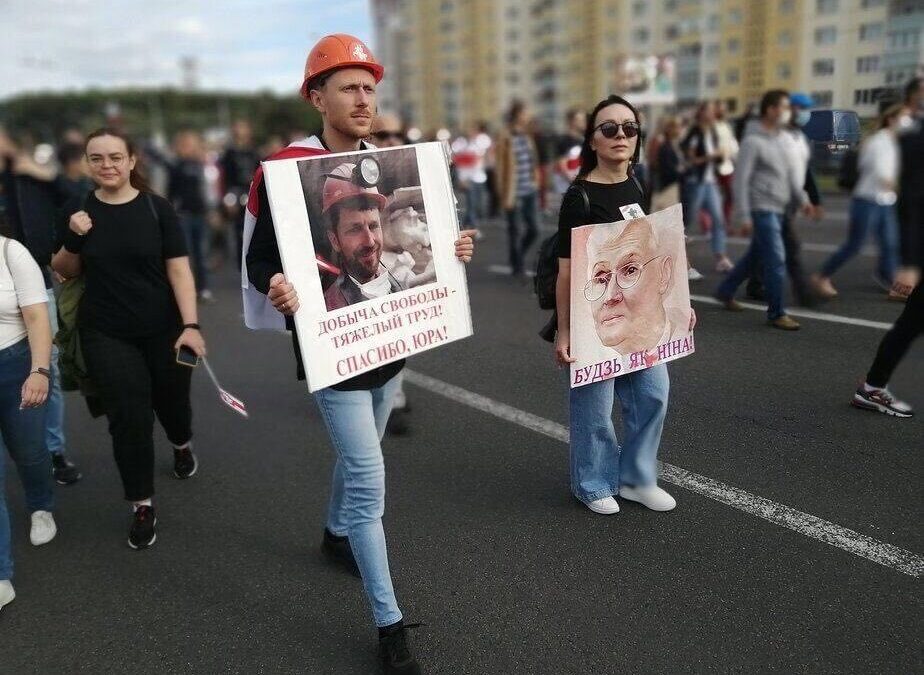
Oct 30, 2020
A vicious crackdown in Belarus on striking workers peacefully protesting President Lukashenko’s refusal to leave power despite months-long popular protests is drawing the attention and condemnation of worker and human rights experts, including Amnesty International, the AFL-CIO, the Solidarity Center and the International Trade Union Confederation (ITUC).
“The right to strike is guaranteed under international law, and the government is obliged to respect this right, all the more because Belarus has ratified ILO Conventions 87 and 98,” says ITUC General Secretary Sharan Burrow, who also denounced Belarus’s violation of workers’ fundamental right to freedom of assembly and of association rights through police violence and threats targeting the general public.
Lukashenko, in power since 1994, claims to have won the August 9 presidential election by a landslide, even though his political opponents and citizens charge poll-rigging. The country’s almost daily protests since then have incurred an authoritarian response that, so far, has led to several deaths, hundreds of injuries and more than 10,000 arrests.
In Minsk, where 100,000 people marched to deliver a “People’s Ultimatum,” authorities cut off mobile internet access, closed down public transportation, turned out balaclava-clad riot police and military and riot control vehicles at strategic sites, and attacked protesters in the evening.
Participants in Monday’s general strike, including ITUC affiliate the Belarusian Congress of Democratic Trade Unions (BKDP), demanded Lukashenko’s resignation, a halt to the crackdown and the release of political prisoners. Thousands stayed home or took to the streets—including workers at state-owned factories and private enterprises, including restaurants and cafes—as well as university students and their teachers. At least 155 people were arrested for supporting the strike in Minsk, Borisov, Brest, Grodno, Mogilev and Novopolotsk, human rights group Vesna reported.
Intimidation may have had a chilling factor on the strike, says the BKDP, who also reported that peacefully protesting workers at Minsk’s Hi-Technology Park were being intimidated and dispersed. Other intimidation tactics included visits by security officers to the homes of workers who failed to start their shift at Grodno Azot, a major nitrogen fertilizer producer in Grodno, as reported by the Associated Press.
“A frank disregard is being shown for the most basic of human rights, and the right to strike is now one more that is being mercilessly crushed,” says Amnesty International Acting Director for Eastern Europe and Central Asia Denis Krivosheev.
The AFL-CIO, in a letter to the BKDP president, praised the BKDP, its affiliates and members for their support for worker rights and democracy despite government repression and harassment.
“Intimidation must end. We support the right of workers to participate in collective actions specifically to demand fair and democratic elections,” says Solidarity Center Europe and Central Asia Director Rudy Porter.
The ITUC Global Rights Index, has ranked Belarus “no guarantee of rights” for many years under Lukashenko’s government, including in 2020, in part because legal strikes are effectively impossible while illegal strikes fall afoul of severely punitive legislation.
Update: Read the BKDP’s November 2 statement regarding the punishment of striking workers and their leaders, in Russian.
Oct 26, 2020
“The new accord [USMCA] also includes provisions to permit collective bargaining and to close loopholes allowing Mexican employers to profit by mistreating their workers … On paper, the Mexican reforms would allow workers to organize unions outside of the company-controlled ‘white’ unions that exist to guarantee big employers labor peace. Even before the pandemic slowed government operations, implementation was behind schedule, according to Gladys Cisneros, Mexico program director for Solidarity Center, an AFL-CIO affiliate.”
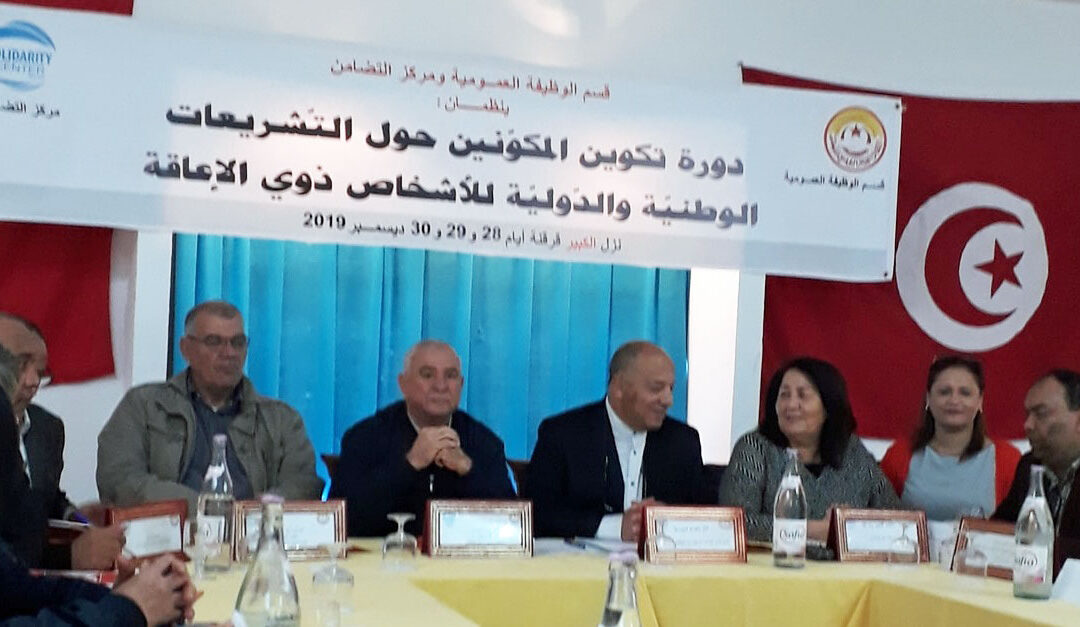
Sep 30, 2020
When the Tunisian Parliament this summer approved a law increasing the percentage of people with disabilities in civil service, union activists and their allies in the disability rights and human rights movements took a moment to celebrate the victory—and to reflect on the five-year advocacy campaign it took to achieve this goal.
“By paying attention to the issues of people with disabilities, working on more information and support for them, and considering their rights an integral part of the human rights system, people with disabilities are able to make valuable contributions to their communities if opportunities are available to them,” the Tunisian General Labor Union (UGTT) said in a statement.
The new law stipulates that no fewer than 5 percent of annual public service assignments for workers with a college degree who have been unemployed for 10 years are allocated to differently abled workers.
Unions, Civil Society Coalition Key to Success
A broad-based partnership with key disability rights activists fueled the campaign’s success. With Solidarity Center support, a 10-member leadership committee of differently abled workers from the UGTT and the Arab Forum for Persons with Disabilities, and a prominent civil society activist steered the project. The committee, half of whom were women, conducted train-the-trainer sessions with union leaders and representatives of organizations focused on the economic and social integration of workers with disabilities who, in turn, held similar trainings across the country.
“The rights of persons with disabilities are an integral part of the human rights system,” says Moanem Amira, assistant secretary general in charge of civil service unions, and coalition partner. Universal Human Rights frameworks, such as the United Nations’ Convention on the Rights of Persons with Disabilities, establish the right of those with disabilities to decent work without discrimination or exclusion.
Building on internationally guaranteed rights, the coalition strategized with workshop participants around the country on crafting campaigns for passage of national legislation. The coalition organized awareness days, including those that focused on the role of unions in reaching workers with disabilities, and mobilized them to achieve their economic and social rights. Workers and rights activists went on to champion the socio-professional inclusion of individuals with disabilities in the workplace and connect with government representatives to monitor and follow up on violations against workers with disabilities.
Dozens of workers with disabilities joined unions throughout the campaign through the outreach of activists such as Nabil Moumni. From his home in Gabes, in southeastern Tunisia, Moumni interviewed workers with disabilities in the public and private sectors to better understand their working conditions, held trainings and shared with workers the benefits of forming unions to achieve their rights.
A disability rights activist since 2012, Moumni says his involvement in the project and the hard work of those involved inspired him “to be a more enthusiastic as an activist.
“Everyone who took part in this project did their very best to reach important outcomes, because now awareness of human rights among trade unionists has reached a stage of maturity that makes the UGTT a locomotive for advocating social issues in Tunisia,” he says.
Moving the Campaign Forward
One billion people, or 15 percent of the world’s population, experience some form of disability, with 80 percent to 90 percent of working age people with disabilities unemployed in developing countries.
Persons with disabilities are more likely to experience adverse socioeconomic outcomes than persons without disabilities, such as under education, a higher drop-out rate, lower levels of professional integration and higher poverty levels.
Early on in the campaign, the coalition conducted a first-of-its-kind survey to examine how workers with disabilities and unions can address discrimination and lack of accessibility for workers in Tunisia. The survey surfaced the immense obstacles workers with disabilities face in finding good jobs. In particular, women with disabilities are challenged by the double burden of sexism and ableism. Sexual harassment, violence and other forms of abuse mean job opportunities can be both scarce and exploitative.
So even while celebrating passage of the new law, coalition members say they are planning to continue working to ensure workers with disabilities can exercise their rights—and already are organizing awareness-raising and advocacy campaigns and building a regional network to support workers with disabilities who can take part in improving their rights at work and in their communities.
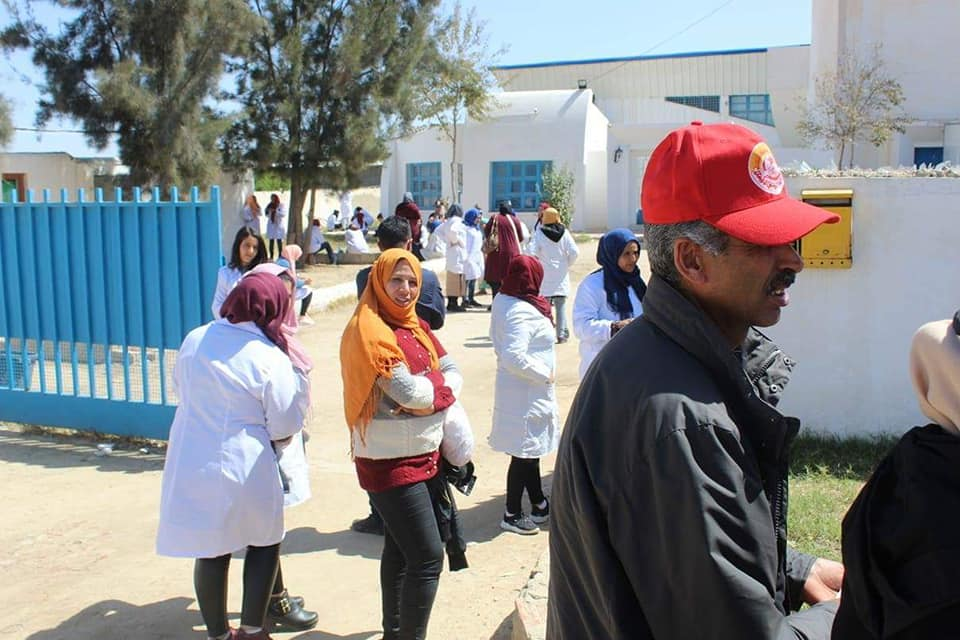
Sep 9, 2020
The Tunisian General Labor Union (UGTT) is calling on employers and the government to join with it in addressing the severe challenges textile workers are facing during the COVID-19 crisis and negotiate an action plan to guide the struggling garment sector.
Some 160,000 workers, the vast majority of whom are women younger than age 35, work in Tunisia’s textile industry, which accounts for 34 percent of the country’s manufacturing sector. Following the country’s coronavirus lockdown, workers lost jobs and pay, in part because the industry experienced a 45.2 percent decline in textile exports in March from the previous year, according to the National Institute of Statistics in Tunisia. Many corporate brands also canceled “mid-season” orders.
But crucially, employers also took advantage of the COVID-19 crisis to cease or suspended paying workers’ social security benefits or family allowances, such as food tickets, under the pretext of force majeure, union leaders say. Employers coerced workers, especially new employees, into signing fixed-term contracts and giving up their status as permanent workers. Workers also say some employers blocked their efforts to form unions to gain fundamental rights on the job, closed union offices—prohibiting workers from meeting in the office even outside working hours—and removed posters and other legally placed union material from worksites.
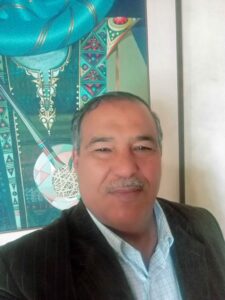
Habib Al-Hazami. Credit: General Federation of Textile Leather and Footwear
“All trade union activists and the General Federation affirm that the garment and textile sector in Tunisia has been marginalized and is facing a crisis,” says Habib Al-Hazami, general secretary of the General Federation of Textile, Leather, and Footwear.
In April, the Tunisian General Labor Union (UGTT) and the Tunisian Federation for Industry and Trade entered into a landmark agreement on workers’ wages, including textile workers’ wages. The government agreed to contribute $73 per worker, with the remaining salary paid by employer. Employers also agreed to register unregistered workers with the National Social Security Fund within a month after the agreement to ensure they are eligible for social benefits.
Although the lockdown ended June 27 and many factories resumed nearly full production, union leaders say worker rights’ violations persist, with factories not following government regulations to slow the spread of the novel coronavirus.
In calling for discussions with employers and the government, UGTT is seeking to:
- Strengthen job security for garment and textile workers by reducing short-term contracts and increasing formal employment.
- Examine how best to restructure the sector with a focus on ethical market competition so workers do not bear the brunt of corporate brands’ rush for products at the lowest cost.
- Take urgent steps to end gender-based violence and harassment at work and ensure decent working conditions.
- Increase workplace inspections to monitor potential safety and health violations.
- Create space for workers to form and join unions so they have a voice on the job.






